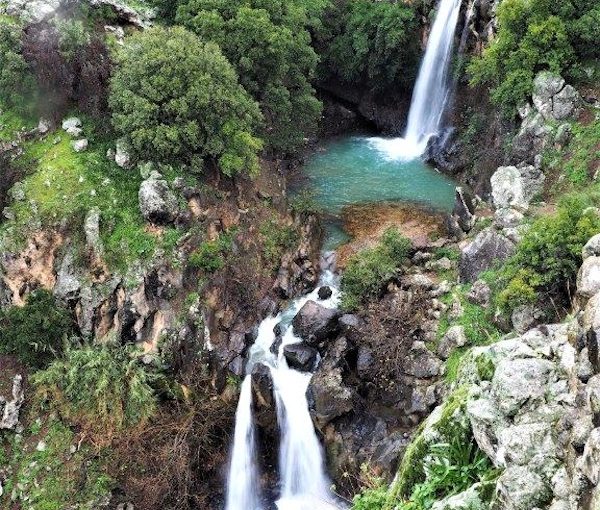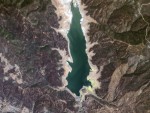A July 2014 Planet Labs satellite image of a reservoir in California’s Lake County that supplies water to nearby Yolo County. In a non-drought year, according to Planet Labs, the visible water would cover roughly twice the area as it does in this picture. (photo from Planet Labs via Wikimedia Commons)
California headlines this month scream “water shortage” – but the shortage is not limited to the western United States. According to a recent report by the U.S. Environmental Protection Agency, while the demand for freshwater resources is increasing, the supply remains constant and many regions are starting to feel the pressure. The report states that water managers in 40 of 50 states expect water shortages in some portion of their states within the next 10 years.
Amid this grave prognosis, a new Israeli research project might make the Jewish state an important part of the solution.
In what is arguably one of the most innovative water research consortiums to date, researchers from Ben-Gurion University of the Negev (BGU), Technion-Israel Institute of Technology, Hebrew University of Jerusalem and Australia’s Monash University are working to develop “water-sensitive cities.” The description for the project, which is funded by the Jewish National Fund (JNF), says that water-sensitive cities adopt and combine decentralized and centralized water management solutions to deliver water security. The data gathered from the project may be used to support development of urban master plans in cities in Israel and around the world.
Researchers are grouped into teams, each focusing on a different aspect of creating water-sensitive cities.
Eran Friedler, senior research fellow and head of the Water Forum Project at Technion, leads a team whose objective is to develop a holistic vision for water-sensitive cities in Israel encompassing scientific, economic and societal aspects, and accounting for the potential effects of global warming on temperatures and rainfall regimes. The analysis seeks to quantify the effect of urbanization and changing urban texture on storm water harvesting potential.
Evyatar Erell, a professor in the Bona Terra Department of Man in the Desert at BGU, is responsible for water-sensitive urban planning and design. He explained that his role is to examine conventional hydrological planning of cities and to see how it can be improved. This means reducing impermeable surfaces (sidewalks, parking lots, driveways, etc.) in favor of more permeable surfaces, sometimes innovative ones, such as green roofs or the infusion of small bits of garden along footpaths.
“We are trying to determine how to use water as effectively as possible, to maximize its benefits to pedestrians, reduce energy consumption by our buildings, and ensure environmental sustainability,” said Erell.
Read more at jns.org.


